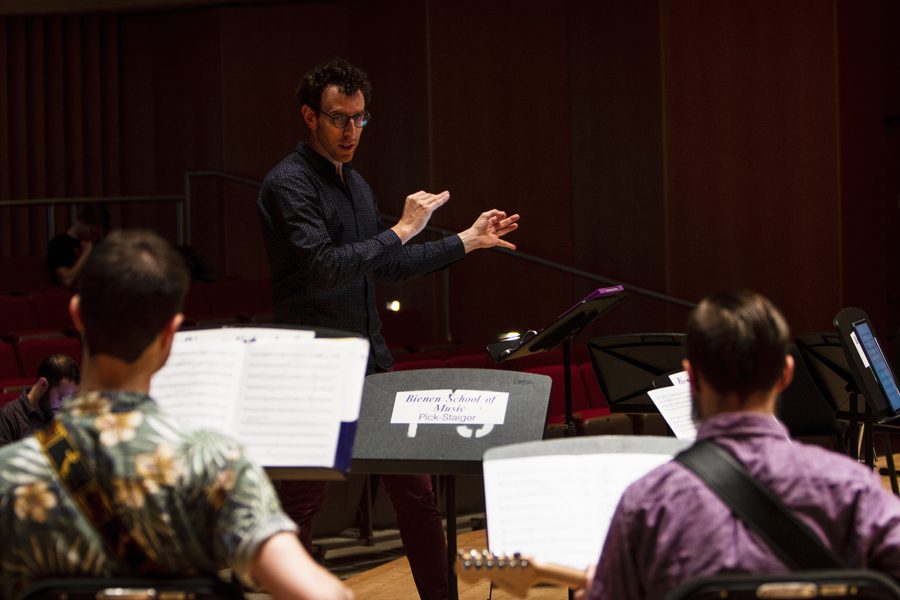Student ensemble to perform challenging final concert
Alan Pierson leads the Contemporary Music Ensemble in rehearsal. The orchestral group will hold their final concert of the year on May 24 at Galvin Recital Hall.
May 22, 2019
From drumming to DJing, music is ever-evolving, and Northwestern students are keeping up with the times. If you close your eyes, you might think you’re listening to an electronic record, created with synthesized, computerized effects. When you open them, you will see the Contemporary Music Ensemble.
The Bienen group, which uses between nine and 18 students in most of its pieces, will bid the school year farewell on May 24 with a concert that will defy instrumental norms and show off incredibly difficult techniques. CME will perform six pieces in the Galvin Recital Hall, three of which were originally created as electronic music by acclaimed electronic music producer Aphex Twin.
The tracks by Aphex Twin, real name Richard David James, are only playable because of the early 2000’s work by a music collective called Alarm Will Sound. AWS is a genre-bending orchestra of respected musicians from across the country that the New York Times called “the future of classical music.”Alan Pierson, co-director of CME, leads AWS and in 2001 helped arrange the music into something the collective could play with traditional instruments.
Pierson said the electronic Aphex Twin pieces the ensemble will play, are deep, challenging and exciting — “an important part of what’s happening in our musical world.” That’s what drew the conductor to the idea, both at the turn of the century and now with CME — he will be conducting all three of the Aphex Twin works in the upcoming concert.
“I really see my role pedagogically here to give students the broadest range of experience I can of the exciting music that’s happening of our time and to introduce them to the skills that are needed to really play the music well,” Pierson said.
Production assistant Autumn Selover, who will play piano and drums at the concert, said where Aphex Twin could program his music mechanically, CME has to really focus on and communicate to all its working parts to play at such a blistering speed.
She added the group will also have to pull out a range of sound effects to perfectly imitate Aphex Twin’s music. A bassoon reed stuck into a french horn mouthpiece will produce a “growly but brassy” sound, an engraving tool will be scraped in a soup can and one musician will even bang oven racks together.
“You’re trying to mimic electronic sounds with acoustic instruments, so there’s definitely room for interpretation,” Selover said. “There’s definitely room to kind of have an idea and do what you have to do to get that sound.”
CME co-director Ben Bolter, who is conducting one of the show’s works, also has experience with Aphex Twin pieces — he wrangled with two of the arrangements alongside Pierson at Indiana University in 2007. At both IU and AWS, the feasibility of the project was called into question due to its challenging nature.
But finishing his fifth year as co-director, Bolter said he’s impressed with the intelligence of the new generation of young musicians — the “kids these days” were already making serious strides by the second and third rehearsals of the Aphex Twin pieces.
“What people are able to do so young now is insane,” Bolter said. “They are killing it, and it’s going to be pretty mind-blowing to experience what the students of today are doing.”
Correction: A previous version of this article in one instance misspelled conductor Ben Bolter’s last name. Ben Bolter is the correct spelling. The Daily regrets the error.
Email: stephencouncil2022@u.northwestern.edu
Twitter: @stephencouncil


